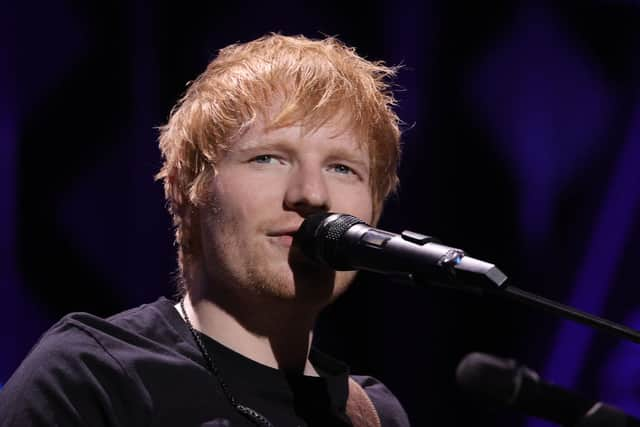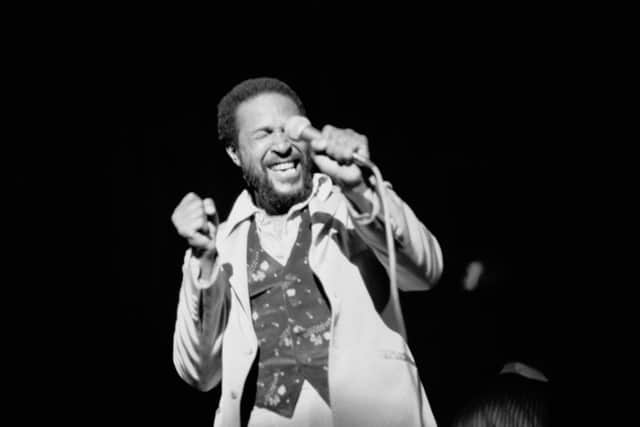Ed Sheeran vs Marvin Gaye: Thinking Out Loud copyright case explained - did star ‘steal’ Let’s Get It On ideas
and live on Freeview channel 276
Singer-songwriter Ed Sheeran has been proven innocent of stealing songs once again after a jury found that he was not liable for copyright infringement against Motown singer Marvin Gaye's most iconic song.
It’s been a favourite first dance song at weddings across the UK since its release in 2014, but Sheeran’s hit ‘Thinking Out Loud’ faced a court challenge over allegations the singer ‘stole’ elements of Gaye’s tune ‘Let’s Get It On’. In a US court case that was reminiscent of the superstar’s legal battle with London artist Sami Chokri in 2022 - a case Sheeran won - he proved to the jury that key parts of his track do not infringe the copyright of the 1973 track.
Advertisement
Hide AdAdvertisement
Hide AdHeirs of Ed Townsend, Gaye's co-writer on the 1973 soul classic, sued Sheeran in 2017, alleging the English pop star’s hit 2014 tune has “striking similarities” to Let’s Get It On and “overt common elements” that violate their copyright. Throughout the trial, Sheeran sang live in the courtroom, while he also told the court that if his song was found to have infringed on the copyright of the 1973 hit he as "done" with music.
Here’s everything you need to know.


What is the Ed Sheeran copyright case about?
Ed Sheeran’s latest legal challenge over copyright infringement concerns perceived similarities between his track ‘Thinking Out Loud’ and Marvin Gaye’s hit ‘Let’s Get It On’.
Originally started in 2017, the owners of the Marvin Gaye track - investment banker David Pullman and a firm called Structured Asset Sales (SAS) - alleged that Sheeran and his co-writer Amy Wadge “copied and exploited, without authorisation or credit” parts of Gaye’s song.


This included, but is not limited to, the following elements of ‘Let’s Get It On’:
- Melody
- Rhythms
- Harmonies
- Drums
- Bass line
- Backing chorus
- Tempo
- Syncopation
- Looping
Advertisement
Hide AdAdvertisement
Hide AdPullman and SAS - who own the estate of the song’s co-writer Ed Townsend - want $100 million (£90 million) in damages from Sheeran. The case has nothing to do with the family of Marvin Gaye, who died in 1984 aged 44 after being shot by his father in a domestic altercation.
It is not the first time a Marvin Gaye song has been in court as a result of copyright infringement claims. Robin Thicke and Pharrell Williams hit ‘Blurred Lines’ was deemed to have copied 1977 hit ‘Got To Give it Up’ in 2015, with Marvin Gaye’s estate getting a multimillion pound payout and half of all future royalties.
Why did the Ed Sheeran copyright case go to court?
Ed Sheeran had sought to dismiss the lawsuit. The star’s lawyers denied the allegations of copyright infringement, and said the combination of elements Sheeran allegedly took was not unique enough to be covered by copyright law.
But in September last year, US District Judge Louis Stanton denied the motion to throw out the case after musical experts on both sides failed to agree on the allegations.


Advertisement
Hide AdAdvertisement
Hide Ad“There is no bright-line rule that the combination of two unprotectable elements is insufficiently numerous to constitute an original work,” Judge Stanton wrote in his ruling, which was obtained by the PA news agency.
“A work may be copyrightable even though it is entirely a compilation of unprotectable elements.”
In conclusion, he wrote: “Sheeran’s motion for summary judgement dismissing SAS’s claim for infringement is denied."
Following the not liable verdict, Sheeran said: “I’m obviously very happy with the outcome of this case and it looks like I’m not going to have to retire from my day job after all. At the same time, I am absolutely frustrated that baseless claims like this are allowed to go to court at all.”
Advertisement
Hide AdAdvertisement
Hide AdHe added: “Having to be in New York for this trial has meant that I have missed being with my family at my grandmother’s funeral in Ireland. I won’t get that time back. We need songwriters and the wider musical community to come together to celebrate and support creativity.
“These claims and the people who manipulate songwriters for their own gain need to be stopped so that the creative process can carry on and we can all get back to making music. I am not and never will allow myself to be a piggy bank for someone to shake.”
Joe Wadsworth, musicologist and founder of The Online Recording Studio, commented: “Copyright infringement cases are a musical minefield and Ed Sheeran and his reputation have once again come through unscathed.
“This time the stakes were much higher for the singer, due to the legendary status of the song — and the artist — he was accused of plagiarising. The New York court was effectively ruling over his songwriting credentials as well as his honesty, and Sheeran passed with flying colours.
Advertisement
Hide AdAdvertisement
Hide Ad“These suits are now so common within the industry that record labels are incorporating legal fighting funds into their album budgets. Sheeran himself has previously complained that claims are encouraged due to the prospect of huge settlements. Yet the rise of technology may spell the end of this gravy train.
“It’s highly likely that generative AI will change the way copyright cases are fought in the future. Advances mean that music can now be created from a melting pot of all the songs ever written, and draw upon every influence. Machine algorithms, rather than humans, are set to be the jurors of the future, comparing two songs and setting a threshold for accusations of copying.”
Comment Guidelines
National World encourages reader discussion on our stories. User feedback, insights and back-and-forth exchanges add a rich layer of context to reporting. Please review our Community Guidelines before commenting.
